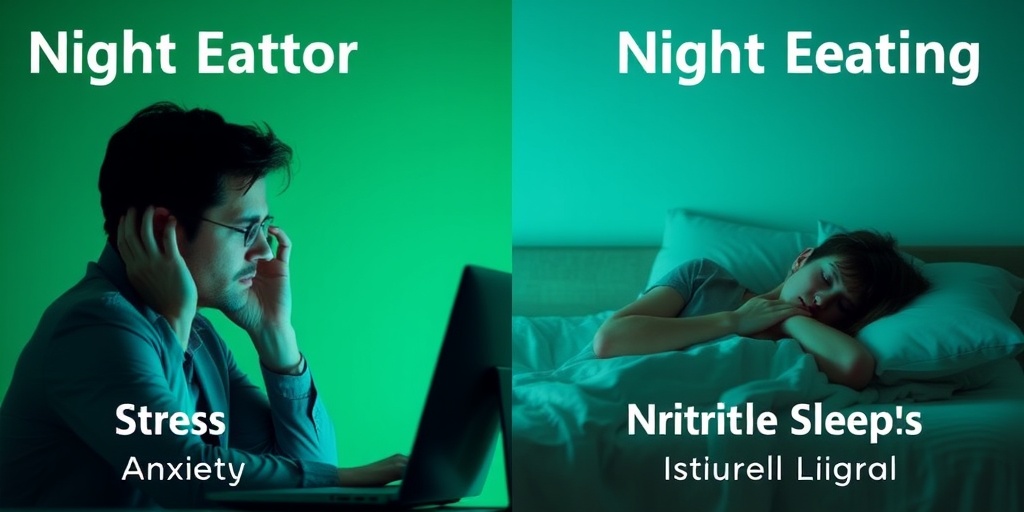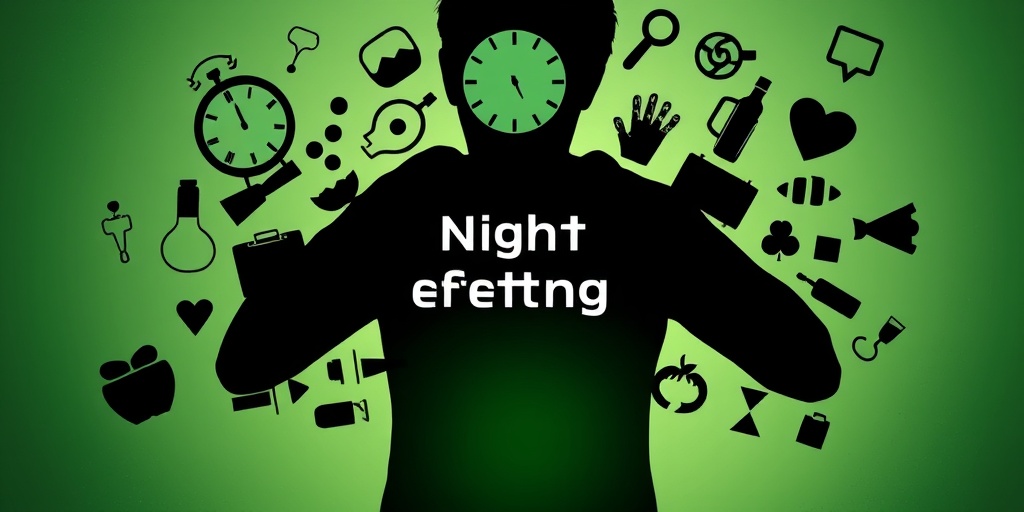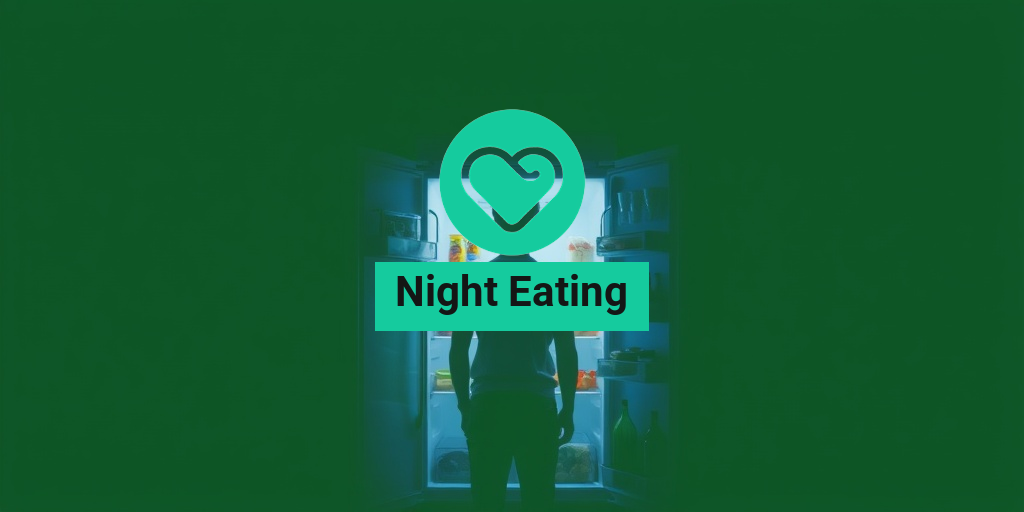What Is Night Eating?
Night eating is a phenomenon that many people experience, yet it often goes unnoticed or unaddressed. It refers to the habit of consuming a significant portion of daily calories during the night, typically after dinner. This behavior can manifest in various ways, from late-night snacking to more severe forms, such as Night Eating Syndrome (NES).
Night Eating Syndrome is a specific eating disorder characterized by a pattern of late-night eating, often accompanied by a lack of appetite in the morning. Individuals with NES may find themselves consuming large amounts of food during the night, leading to feelings of guilt and distress. This condition can significantly impact one’s physical and mental health, making it essential to understand its causes and symptoms.
The Psychology Behind Night Eating
Understanding the psychological factors that contribute to night eating is crucial. Many individuals turn to food as a source of comfort or stress relief, especially during late hours when distractions are minimal. This behavior can be exacerbated by emotional issues, such as anxiety or depression, leading to a cycle of binge eating at night.
Moreover, some studies suggest that night eating may be linked to hormonal imbalances, particularly in the regulation of appetite. For instance, disruptions in the hormones ghrelin and leptin can lead to increased hunger and cravings during the night. This hormonal imbalance can be influenced by various factors, including sleep patterns, lifestyle choices, and overall mental health.
Night Eating Symptoms
Recognizing the symptoms of night eating is vital for those who may be struggling with this condition. Here are some common signs to look out for:
- Frequent Late-Night Snacking: Consuming large quantities of food after dinner, often leading to feelings of fullness and discomfort.
- Lack of Appetite in the Morning: Many individuals with night eating syndrome report not feeling hungry during breakfast or lunch, which can lead to a cycle of overeating at night.
- Emotional Eating: Using food as a coping mechanism for stress, anxiety, or depression, particularly during the late hours.
- Guilt and Shame: Feelings of guilt or shame after eating at night, which can further perpetuate the cycle of night eating.
- Sleep Disturbances: Night eating can disrupt sleep patterns, leading to insomnia or poor-quality sleep.
Impact on Health
Night eating can have several negative effects on both physical and mental health. Physically, it can lead to weight gain, digestive issues, and increased risk of chronic conditions such as diabetes and heart disease. Mentally, the cycle of guilt and shame associated with night eating can contribute to anxiety and depression, creating a vicious cycle that is hard to break.
If you find yourself identifying with these symptoms, it may be beneficial to seek help. Resources like Yesil Health AI (yesilhealth.com) provide evidence-based information and support for individuals struggling with eating disorders, including night eating syndrome.
When to Seek Help
If night eating is affecting your quality of life, it’s essential to reach out for support. Consulting with a healthcare professional or a registered dietitian can provide valuable insights and strategies to manage this behavior. They can help you develop a personalized plan that addresses both the psychological and physical aspects of night eating.
In conclusion, night eating is a complex issue that can significantly impact one’s health and well-being. By recognizing the symptoms and understanding the underlying causes, individuals can take proactive steps towards healthier eating habits and improved mental health. Remember, you are not alone in this journey, and resources are available to help you navigate through it. 🌙🍽️

Causes of Night Eating
Night eating, often referred to as night eating syndrome (NES), is a complex behavior that can stem from various psychological, physiological, and environmental factors. Understanding the underlying causes can help individuals manage their eating habits more effectively.
Psychological Factors
Many people who experience night eating may have underlying psychological issues. Conditions such as anxiety, depression, and stress can lead to emotional eating, where individuals turn to food for comfort during the night. This behavior can create a cycle of guilt and shame, further exacerbating the emotional turmoil.
Physiological Factors
Physiological factors also play a significant role in night eating. Disruptions in the body’s natural circadian rhythms can lead to altered hunger signals. For instance, individuals with night eating syndrome often report a lack of appetite during the day, which can lead to excessive eating at night. Hormonal imbalances, particularly involving leptin and ghrelin (the hormones that regulate hunger), can also contribute to this phenomenon.
Environmental Triggers
Environmental factors can significantly influence night eating behaviors. For example, a stressful home environment or exposure to food cues, such as advertisements or the sight of food in the kitchen, can trigger late-night cravings. Additionally, lifestyle choices, such as irregular sleep patterns or late-night work schedules, can disrupt normal eating habits and lead to increased night eating.
Social Influences
Social dynamics can also impact night eating. For instance, individuals may feel pressured to eat during social gatherings or may engage in late-night snacking while watching television or socializing with friends. This can create a habit of eating at night, even when not physically hungry.
Risk Factors for Night Eating
Identifying the risk factors associated with night eating can help individuals recognize their own behaviors and seek appropriate interventions. Here are some common risk factors:
Age and Gender
Research indicates that night eating syndrome can affect individuals of all ages, but it is more prevalent among young adults and middle-aged individuals. Additionally, studies suggest that women may be more likely to experience night eating than men, possibly due to hormonal fluctuations and societal pressures regarding body image.
Existing Eating Disorders
Individuals with a history of eating disorders, such as binge eating disorder or bulimia, are at a higher risk for developing night eating syndrome. The patterns of disordered eating can lead to a cycle of bingeing at night, making it crucial for those affected to seek professional help.
Sleep Disorders
Sleep disorders, such as insomnia or sleep apnea, can contribute to night eating behaviors. Poor sleep quality can lead to increased cravings for high-calorie foods, as the body seeks quick energy sources to combat fatigue. This can create a vicious cycle where poor sleep leads to unhealthy eating habits, which in turn affects sleep quality.
Stress and Mental Health Issues
As mentioned earlier, stress and mental health issues are significant risk factors for night eating. Individuals dealing with chronic stress, anxiety, or depression may find themselves turning to food as a coping mechanism during the night. Recognizing and addressing these mental health concerns is essential for breaking the cycle of night eating.
Lifestyle Choices
Unhealthy lifestyle choices, such as irregular meal patterns, excessive caffeine consumption, and lack of physical activity, can also increase the risk of night eating. Establishing a balanced routine that includes regular meals and physical activity can help mitigate these risks.
In conclusion, understanding the causes and risk factors associated with night eating is crucial for those looking to manage their eating habits effectively. By addressing psychological, physiological, and environmental influences, individuals can work towards healthier eating patterns and improved overall well-being. 🌙🍽️

Diagnosis of Night Eating
Diagnosing Night Eating Syndrome (NES) can be a complex process, as it often overlaps with other eating disorders and psychological conditions. Understanding the signs and symptoms is crucial for both individuals and healthcare professionals. Here’s a closer look at how NES is diagnosed.
Understanding the Symptoms
Night Eating Syndrome is characterized by a pattern of late-night eating, often accompanied by a lack of appetite during the day. Key symptoms include:
- Consuming large amounts of food at night: This can include snacks or meals, often high in carbohydrates and sugars.
- Feeling a lack of control: Individuals may feel compelled to eat at night, even when they are not physically hungry.
- Insomnia or disrupted sleep patterns: Many people with NES experience difficulty falling asleep or staying asleep, which can exacerbate their eating habits.
- Emotional distress: Feelings of guilt or shame about eating at night are common, as well as anxiety or depression.
Utilizing Questionnaires for Assessment
Healthcare providers often use specific questionnaires to assess the likelihood of NES. One popular tool is the Night Eating Questionnaire, which helps identify the frequency and nature of night eating behaviors. This questionnaire typically includes questions about:
- Eating habits during the night
- Daytime eating patterns
- Emotional triggers related to eating
By evaluating responses, healthcare professionals can gain insights into the severity of the condition and tailor treatment options accordingly.
Consulting a Professional
If you suspect you or someone you know may be experiencing Night Eating Syndrome, it’s essential to consult a healthcare professional. They may conduct a thorough medical history review and physical examination to rule out other conditions, such as sleep disorders or metabolic issues. In some cases, they might recommend a referral to a psychologist or psychiatrist for further evaluation.
Night Eating Treatment Options
Treating Night Eating Syndrome involves a multifaceted approach that addresses both the psychological and physiological aspects of the disorder. Here are some effective treatment options:
Behavioral Therapy
Cognitive Behavioral Therapy (CBT) is one of the most effective treatments for NES. This therapy focuses on identifying and changing negative thought patterns and behaviors associated with night eating. Through CBT, individuals can learn healthier coping mechanisms and develop a more balanced relationship with food.
Medication
In some cases, medication may be prescribed to help manage symptoms. While there is no specific medication for NES, certain antidepressants or anti-anxiety medications can help alleviate symptoms of depression and anxiety that often accompany the syndrome. Always consult with a healthcare provider to discuss potential benefits and side effects.
Dietary Changes
Making adjustments to your diet can also play a significant role in managing Night Eating Syndrome. Here are some tips:
- Balanced meals: Focus on consuming balanced meals during the day to reduce cravings at night.
- Healthy snacks: If you must eat at night, opt for healthier options like fruits, nuts, or yogurt instead of high-sugar snacks.
- Stay hydrated: Sometimes, feelings of hunger can be confused with thirst. Ensure you’re drinking enough water throughout the day.
Sleep Hygiene Practices
Improving sleep quality is crucial for those with Night Eating Syndrome. Here are some effective sleep hygiene practices:
- Establish a routine: Go to bed and wake up at the same time every day to regulate your body’s internal clock.
- Create a restful environment: Ensure your bedroom is dark, quiet, and cool to promote better sleep.
- Avoid screens before bed: Limit exposure to screens at least an hour before bedtime to help your body wind down.
Support Groups
Joining a support group can provide emotional support and practical advice from others who understand the challenges of Night Eating Syndrome. Online forums, such as those found on Reddit, can also be valuable resources for sharing experiences and coping strategies.
In conclusion, diagnosing and treating Night Eating Syndrome requires a comprehensive approach that includes behavioral therapy, dietary changes, and possibly medication. If you or someone you know is struggling with NES, seeking professional help is the first step toward recovery. 🌙🍏

Home Remedies for Night Eating
Night eating can be a challenging habit to break, often leading to feelings of guilt and discomfort. If you find yourself reaching for snacks late at night, there are several home remedies that can help you manage this behavior effectively. Here are some strategies to consider:
1. Establish a Routine
Creating a consistent daily routine can significantly reduce the urge to snack at night. Try to:
- Eat regular meals throughout the day to prevent excessive hunger at night.
- Set a specific time for dinner and stick to it.
- Incorporate healthy snacks during the day to keep your energy levels stable.
2. Stay Hydrated
Sometimes, feelings of hunger can actually be signs of dehydration. Make sure to drink plenty of water throughout the day. Consider keeping a glass of water by your bedside to sip on if you wake up feeling hungry at night. 💧
3. Choose Healthy Nighttime Snacks
If you must eat at night, opt for healthier options. Some great choices include:
- Fruits: Apples, bananas, and berries are nutritious and satisfying.
- Nuts: A small handful of almonds or walnuts can provide healthy fats and protein.
- Yogurt: Low-fat yogurt can be a great source of protein and probiotics.
4. Mindful Eating Practices
Practicing mindfulness can help you become more aware of your eating habits. Try these techniques:
- Eat slowly and savor each bite.
- Pay attention to your body’s hunger cues.
- Avoid distractions like TV or smartphones while eating.
5. Herbal Remedies
Some herbal teas can help calm your mind and reduce cravings. Consider trying:
- Chamomile tea: Known for its calming effects, it can help you relax before bed.
- Peppermint tea: This can aid digestion and curb cravings.
6. Sleep Hygiene
Improving your sleep quality can also help reduce night eating. Here are some tips:
- Establish a calming bedtime routine.
- Avoid screens at least an hour before bed.
- Keep your bedroom dark and cool for optimal sleep conditions.
Long-Term Effects of Night Eating
While occasional late-night snacking may not pose significant health risks, chronic night eating can lead to various long-term effects. Understanding these consequences is crucial for making informed dietary choices.
1. Weight Gain
One of the most common outcomes of night eating is weight gain. Consuming extra calories late at night can lead to an overall increase in daily caloric intake, making it difficult to maintain a healthy weight. Studies have shown that individuals who frequently eat at night are more likely to experience obesity. 🍔
2. Disrupted Sleep Patterns
Eating late at night can interfere with your sleep quality. Heavy meals can lead to discomfort and indigestion, making it harder to fall asleep or stay asleep. This disruption can create a vicious cycle, as poor sleep may increase cravings for unhealthy foods the next day.
3. Increased Risk of Chronic Conditions
Long-term night eating has been linked to several chronic health conditions, including:
- Type 2 Diabetes: Late-night eating can affect insulin sensitivity and glucose metabolism.
- Cardiovascular Disease: Poor dietary habits associated with night eating can increase the risk of heart disease.
- Mental Health Issues: Night eating syndrome has been associated with higher levels of anxiety and depression.
4. Nutritional Deficiencies
Individuals who frequently snack at night may not be getting the essential nutrients their bodies need. Late-night eating often involves processed and unhealthy foods, which can lead to deficiencies in vitamins and minerals over time. This can affect overall health and well-being.
5. Impact on Metabolism
Eating at irregular hours can disrupt your body’s natural circadian rhythms, potentially slowing down your metabolism. This can make it more challenging to lose weight and maintain energy levels throughout the day.
In conclusion, while night eating can be a common habit, understanding its long-term effects and implementing home remedies can help you regain control over your eating patterns. By making mindful choices and prioritizing your health, you can create a more balanced relationship with food. 🌙

Frequently Asked Questions about Night Eating
What is Night Eating Syndrome?
Night Eating Syndrome (NES) is a condition characterized by recurrent episodes of night eating, which may include consuming large amounts of food during the night, often accompanied by insomnia. Individuals with NES may feel a lack of control over their eating habits at night, leading to distress and potential health issues.
What types of food are commonly consumed during night eating?
People who experience night eating often gravitate towards high-calorie foods that are easy to prepare or grab quickly. Common choices include:
- Snacks like chips and cookies
- Ice cream and other desserts
- Fruits, though some may wonder if night eating fruits is healthy
- Leftovers from dinner
Can night eating lead to health problems?
Yes, night eating can contribute to various health issues, including weight gain, digestive problems, and sleep disturbances. It may also exacerbate conditions like anxiety and depression. If you find yourself binge eating at night, it’s essential to seek guidance from a healthcare professional.
Is there a questionnaire to assess night eating habits?
Yes, there are night eating questionnaires available that can help individuals assess their eating patterns and determine if they may be experiencing symptoms of Night Eating Syndrome. These questionnaires typically evaluate the frequency of night eating, feelings associated with it, and its impact on daily life.
What treatments are available for Night Eating Syndrome?
Treatment options for Night Eating Syndrome may include:
- Therapy, such as cognitive-behavioral therapy (CBT)
- Medication, which may help regulate appetite and mood
- Dietary changes to promote healthier eating habits
Can night eating be linked to ADHD?
Some studies suggest a potential link between night eating syndrome and ADHD. Individuals with ADHD may experience impulsivity and difficulty regulating their eating patterns, which can lead to night eating behaviors. If you suspect this connection, consulting a healthcare provider is advisable.
Is it normal to feel hungry at night?
Feeling hungry at night can be normal, especially if you haven’t consumed enough calories during the day. However, if this leads to excessive eating or binge eating, it may be a sign of an underlying issue like Night Eating Syndrome.
Are there any lifestyle changes that can help reduce night eating?
Yes! Here are some lifestyle changes that may help:
- Establish a regular eating schedule throughout the day
- Limit caffeine and sugar intake in the evening
- Create a calming bedtime routine to improve sleep quality
- Stay hydrated to avoid mistaking thirst for hunger
Where can I find support for Night Eating Syndrome?
Support for Night Eating Syndrome can be found through various resources, including:
- Support groups, both online and in-person
- Therapists specializing in eating disorders
- Online forums and communities, such as those found on Reddit
Can I eat carbohydrates at night without gaining weight?
Eating carbohydrates at night does not inherently lead to weight gain. It’s the overall caloric intake and lifestyle factors that matter most. However, if you find yourself binge eating at night, it may be beneficial to evaluate your eating habits and consider healthier options.
If you have more questions about night eating or related topics, feel free to reach out for more information! 🌙




